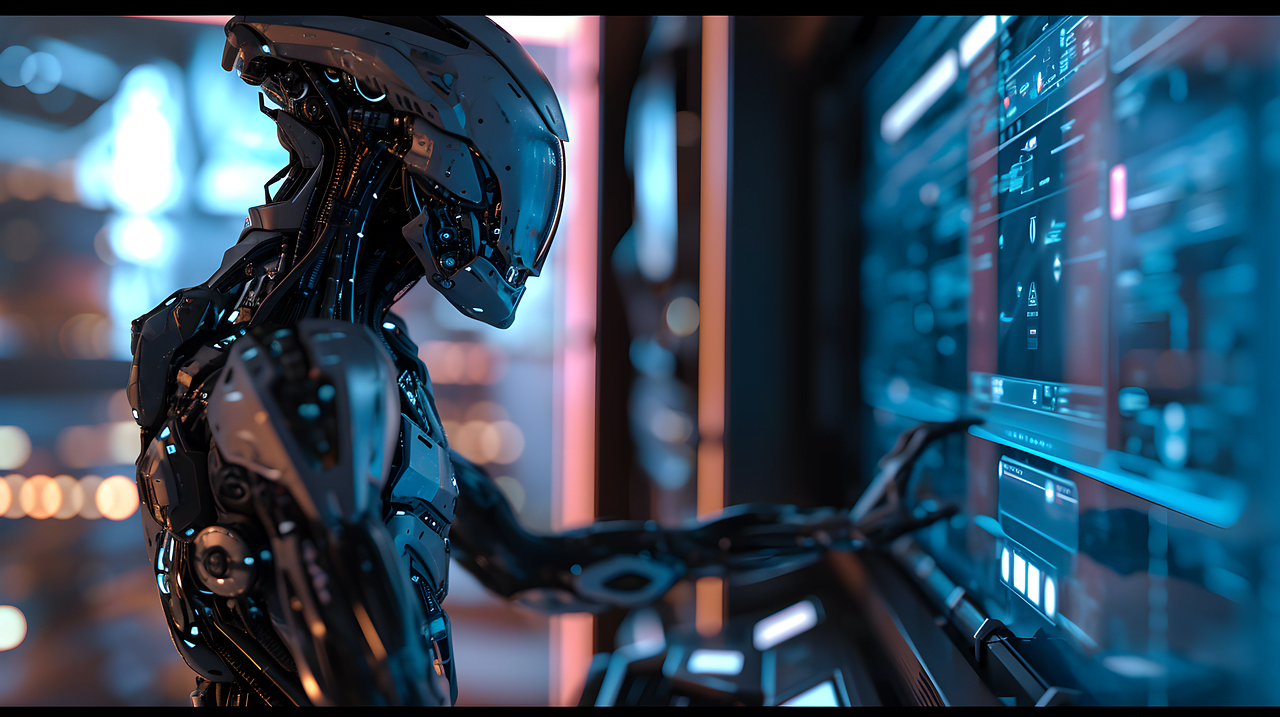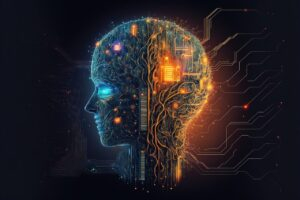Artificial Intelligence ! 2024
What is artificial intelligence?

AI is made up of two words: artificial and intelligence. What do they mean individually?
Artificial is something which does not occur naturally. It is made up of something made by human beings. It is basically a copy of something natural. And intelligence means that when you take the data and process, it becomes information, when you process this information, it becomes knowledge; and when you process this knowledge, it becomes intelligence.
Now we say that artificial intelligence is a branch of computer science which deals with the study and creation of computer systems that exhibit some human intelligence. So, artificial intelligence is the study of how to make computer do things which at moment people do better or we can say artificial intelligence is the ability of a machine perform function that normally require intelligence.
How robotics changing the worlds?
How has AI made our lives better?
Have you ever wondered how your phone can recognize your face to unlock itself ! or how your favorite music app suggest new songs you might like. Well, these are all things enhanced by technology. And possible by artificial intelligence. Its like having a brain inside a computer. One of the common ways we interact with AI is through a virtual assistant like Siri, Alexa, or Google Assistant. These helpful companions can answer questions set reminders play music and even control our smart home. You may know about smart cars. Which is basically controlled by artificial intelligence. They make our lives easier and more convenient.
Recently, we saw special AI chatbots like ChatGPT and Google Bard.
It’s hard to believe that chat gpt has only been around 20 months, and now announcements from open AI and google chat bots are moving way beyond simple tricks of summarizing and
Simply analyzing documents. They can now provide translations in real time. The server and database coils improve speed. Its opening is to earn money by investing in them.
Types of artificial intelligence!
- Reactive machines
This is the most basic type of AI that does not possess knowledge of previous events and is typically used in basic applications where humans can interact and get results within a narrow scope from it, such as playing chess. Other than that, its capabilities are limited and it cannot perform tasks outside their minimal scope of computation.
- Limited memory machines
Machines with limited memory have some data from past events and can perform tasks according to those data sets. This type of AI can be seen in self-driving cars that use a combination of sensors, cameras, and pattern recognition to make turns seed up and slow down and allow for self-driving. However, this type of AI is limited to performing certain tasks and cannot have a clear understanding of the world around them because of the limited memory and time it possesses.
- Theory of mind machines
This type of AI promises to have a visual and contextual representation and understanding of the world. This type of AI would also have an understanding of other entities that are present in this world, but as of yet, this type of AI has not managed to materialize and is still in development.
- Self-aware machines
Machines that have an understanding of the world, others, and themselves are referred to as self-aware machines. This type of AI would be the closest to achieving AGI, being self-aware, although achieving this is currently far from reality and a lot of further advancements are needed to reach AGI, which is the ability to think, learn, reason and have an understanding and decision-making ability to perform various tasks that are easy for us human beings traditionally.
It’s benefits!
AI can be seen in various sectors and industries, making technological advancements quickly and improving the quality of life for people.
- Healthcare
AI in healthcare can assist in clinical trials by saving doctors and patients time and improving the accuracy of diagnosis. AI can use machine learning to diagnose and predict diseases and anomalies far quicker than traditional methods, such as identifying a tumor in its very early stages by pattern recognition and memory of previous medical research. This is proving to be revolutionary in the field of healthcare
2. Finance
AI in finance is primarily used for fraud detection as well as providing companies with analytical data, risk management, managing inventory, making precise calculations and predicting future outcomes for businesses
3. Retail
AI can aid customers in retail by providing them with AI-powered chatbots that cater to their queries and questions, providing better sales and after-sale services It can also recognize patterns learned from customer behavior and provide them with products they might be interested in. AI helps businesses with better inventory management, which saves time and reduces costs for businesses.
4. Transportation
A lot of advancements are being made in transportation, such as autonomous self-driving cars that can drive and navigate themselves through machine learning and pattern recognition. AI is playing a significant role in maintaining traffic congestion by reducing the flow of traffic on roads and making them safer, all whilst saving time for people who are commuting daily
5. Education
AI looks to improve the education system by providing tailored study plans for students, allowing them to learn and study at their own pace. It also aids teachers by automating the grading systems and scheduling, allowing teachers to focus more on students and their studies.
6. Entertainment
AI systems are used in streaming services to curate content for customers by enhancing their viewing experience and giving them suggestions for shows to watch. AI is also being used in the creative industry and is being used in creative content such as short films as well as music.
Risks and ethical issues of AI!
AI poses significant risks for things like the protection of consumer privacy, biased computational programming, unclear regulations, and dangers to humans in the job market, mainly as a replacement for jobs that people are doing. Rapidly replacing AI for jobs that humans are doing is a rising concern.
The Role of Artificial Intelligence in Today’s World and the Future!
Artificial intelligence has a lot of practical and beneficial roles in today’s society, from machine learning to providing better health care and education to self-driving autonomous cars that have the capability to drive autonomously without the need for a driver. Things like voice assistants and chatbots are also of much use in today’s world, helping and providing people with more knowledge and better results in tasks they are performing. As AI continues to improve and advance based on the data that is being fed to it, one thing is for sure: the growth of AI is going to be rapid and it is going to get better over time, but all this comes at an ethical cost to humans, such as jobs being replaced by ai and computational bias. If used correctly, AI is a powerful tool that will help shape the present and the future for humans and the world, which is what AI is aimed towards.




